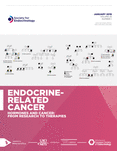Glucose-deprivation increases thyroid cancer cells sensitivity to metformin
- Athanasios Bikas1,
- Kirk Jensen2,
- Aneeta Patel2,
- John Costello Jr2,
- Dennis McDaniel3,
- Joanna Klubo-Gwiezdzinska1,
- Olexander Larin4,
- Victoria Hoperia4,
- Kenneth D Burman1,
- Lisa Boyle5,
- Leonard Wartofsky1 and
- Vasyl Vasko2⇑
- 1Division of Endocrinology, Department of Medicine, Medstar Washington Hospital Center, 110 Irving Street Northwest, Washington, District of Columbia
20010, USA
2Department of Pediatrics, Uniformed Services University of the Health Sciences, 4301 Jones Bridge Road, Bethesda, Maryland 20814-4712, USA
3Biomedical Instrumental Center, Uniformed Services University of the Health Sciences, 4301 Jones Bridge Road, Bethesda, Maryland 20814-4712, USA
4Center for Endocrine Surgery, Kiev, Ukraine
5Department of Surgery, Medstar Georgetown University Hospital, 3800 Reservoir Road, Washington, District of Columbia 20007, USA
- Correspondence should be addressed to V Vasko; Email: vasyl.vasko.ctr{at}usuhs.edu
Abstract
Metformin inhibits thyroid cancer cell growth. We sought to determine if variable glucose concentrations in medium alter the anti-cancer efficacy of metformin. Thyroid cancer cells (FTC133 and BCPAP) were cultured in high-glucose (20 mM) and low-glucose (5 mM) medium before treatment with metformin. Cell viability and apoptosis assays were performed. Expression of glycolytic genes was examined by real-time PCR, western blot, and immunostaining. Metformin inhibited cellular proliferation in high-glucose medium and induced cell death in low-glucose medium. In low-, but not in high-glucose medium, metformin induced endoplasmic reticulum stress, autophagy, and oncosis. At micromolar concentrations, metformin induced phosphorylation of AMP-activated protein kinase and blocked p-pS6 in low-glucose medium. Metformin increased the rate of glucose consumption from the medium and prompted medium acidification. Medium supplementation with glucose reversed metformin-inducible morphological changes. Treatment with an inhibitor of glycolysis (2-deoxy-d-glucose (2-DG)) increased thyroid cancer cell sensitivity to metformin. The combination of 2-DG with metformin led to cell death. Thyroid cancer cell lines were characterized by over-expression of glycolytic genes, and metformin decreased the protein level of pyruvate kinase muscle 2 (PKM2). PKM2 expression was detected in recurrent thyroid cancer tissue samples. In conclusion, we have demonstrated that the glucose concentration in the cellular milieu is a factor modulating metformin's anti-cancer activity. These data suggest that the combination of metformin with inhibitors of glycolysis could represent a new strategy for the treatment of thyroid cancer.
- Revision received 31 August 2015
- Accepted 11 September 2015
- Made available online as an Accepted Preprint 11 September 2015
- © 2015 Society for Endocrinology












